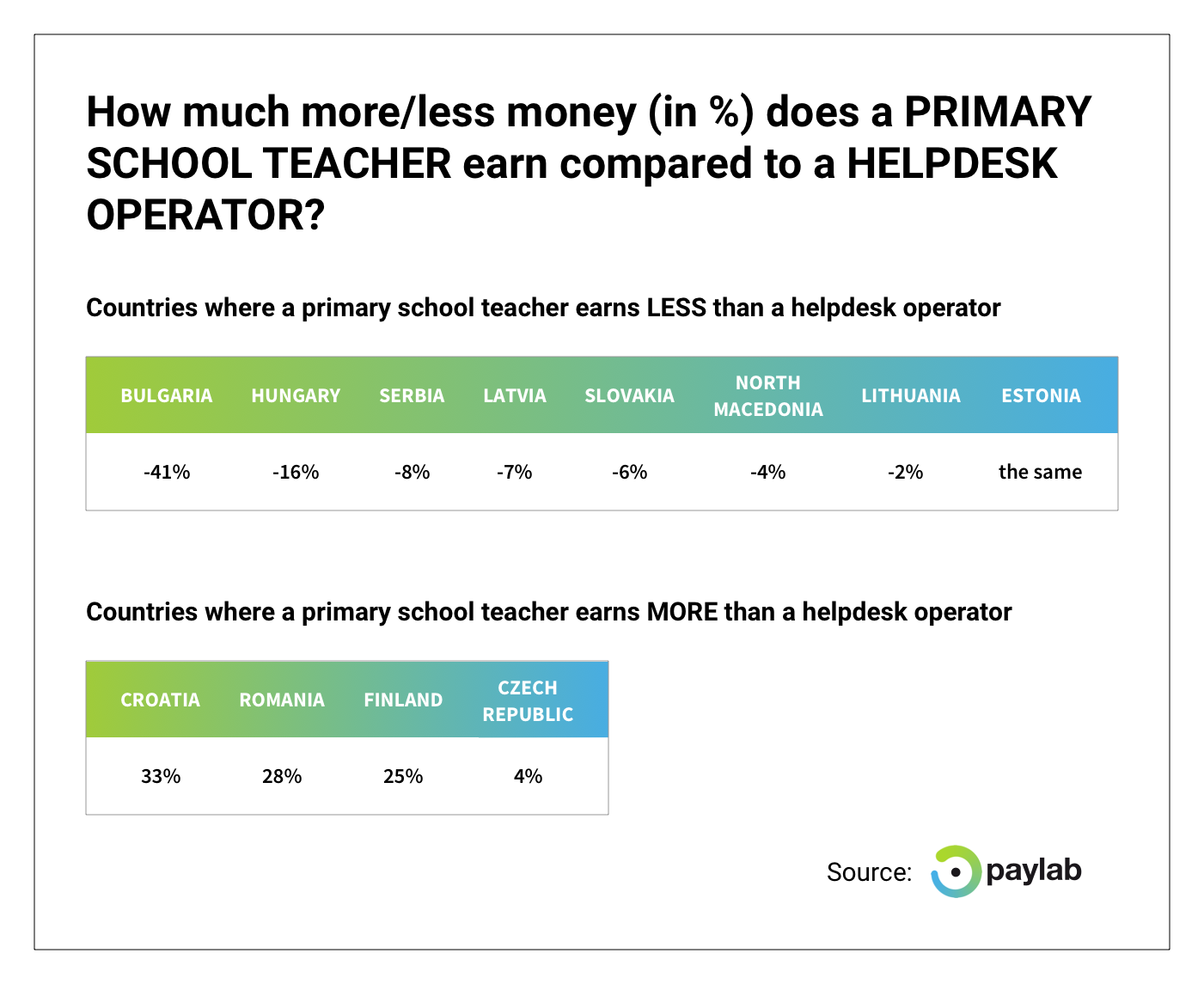Professions that work with people will be much more valued in the future than they are today
9 October 2019

Paylab examined teachers’ salaries in detail and compared them to other selected jobs that involve working with people on a day-to-day basis, such as doctors, shop assistants and customer support staff. According to Paylab’s findings, the salaries paid to teachers in many countries, despite their education, don’t give them much reason to celebrate. Their standing is often comparable to the salaries of employees who have completed secondary level education. The trend, however, indicates that professions focused on working with people will be extraordinarily appreciated and desirable in the future. Manual labour and data may be automated, but working with people, which generates value, will be among the “professions of the future” and their price will continue to grow.
Many employees choose a profession based on the fact that they like people, they are communicative and altruistic and they take their job as their mission. Professions that involve working with people demand a high degree of personal enthusiasm, patience, self-control and empathy.
Staying engaged on a day-to-day basis is emotionally demanding for people. This is the differentiating factor between this type of work and other professions that work with commodities (money, information, data, etc.) or manual labour. Professions such as teacher, manager, caregiver, educator, doctor, nurse, social worker, psychologist and customer support staff often are effected by burnout syndrome. Anywhere there are interactions with people there are also emotions and these employees are often unable to separate themselves from their work.
The demand for professions focused on education, treatment, caregiving and social assistance will remain steady thanks to demographics, but many are turned off by the low salaries. Despite this difficult yet meritorious work, the standard of living for persons working with people is average to below-average in many countries in Central and Eastern Europe. This may change in the future. Many countries want to promote a knowledge economy in the future and to increase the quality of the health and social services that are provided.
Paylab provides an overview of teachers' monthly salaries by school type, including:

Help desk operators earn more than teachers
Data from the international Paylab salary portal shows that in most of the monitored countries where Paylab has a localised version of its salary comparison tool, primary school teachers earn less than staff working in a customer support department. For instance, in Bulgaria, teachers see up to 41 per cent less money on their payslips compared to a help desk operator. A contributing factor is that the labour force is less expensive in the countries of Central and Eastern Europe, which leads global companies to establish their support centres there. Fluency in a foreign language is often a necessary prerequisite for working in customer support, therefore these positions are well paid.

The status of teachers is comparable to shop assistants
According to Paylab’s analysis, the salaries of primary school teachers are only slightly higher than shop assistants in Lithuania, Slovakia, the Czech Republic, Bulgaria, Romania, Macedonia and Latvia. Teachers and shop assistants have the same salaries in Hungary and Bulgaria.
Conversely, teachers enjoy a significantly higher standard of living and societal status in Slovenia, Finland and Croatia compared to those working in retail.

Teachers at the higher education level have the best incomes
Following the structure of the education system, the highest salaries typically belong to educational staff in higher education and the lowest to teachers in primary schools. For instance, in Slovenia, Romania, Croatia, Bulgaria and North Macedonia, higher education educators have salaries that are up to 50 per cent higher than secondary school teachers. Their status and standard of living are high in these countries. It is even comparable to a doctor's salary. Data from respondents show that higher education educators in Romania are truly valued, as they earn double the salary of a doctor.
On the other hand, in the countries of Central Europe, Finland and the Baltic States, teachers in higher education do not have salaries that are significantly higher than their secondary school colleagues. Compared to doctors, teachers in higher education in these countries typically have salaries that are approximately a third lower.






.png)